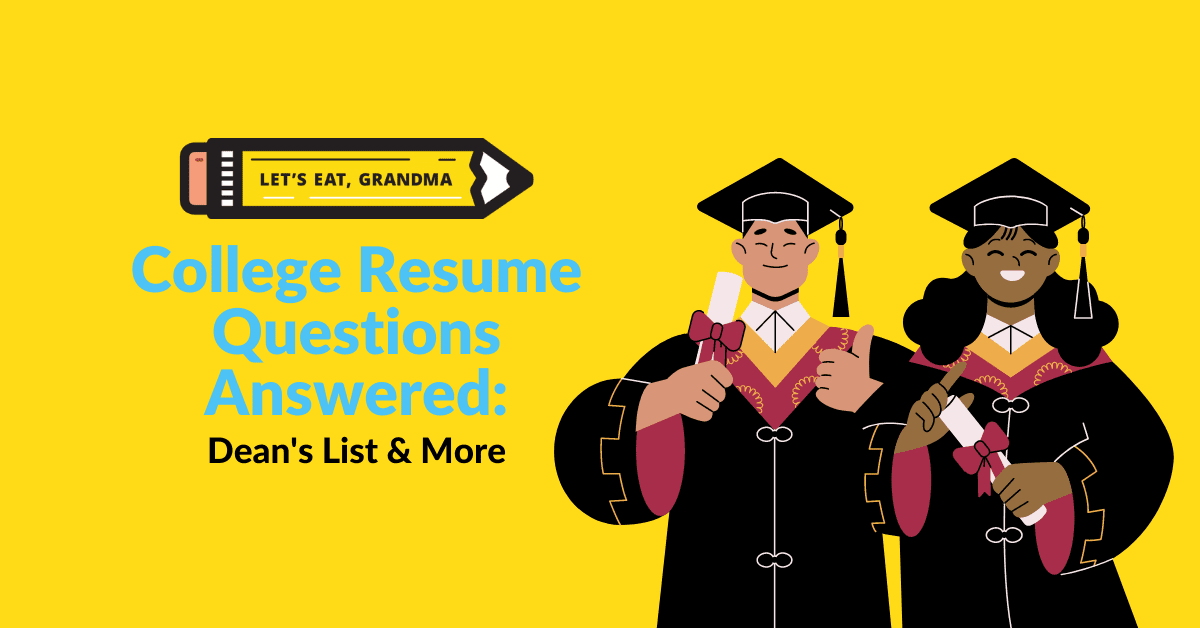College Resume Questions: How to Put Dean’s List, Cum Laude, and a Double Major on Your Resume

Just finished college? Congratulations! Now it’s time to make your achievements shine on your resume so you can start your career journey on solid ground.
By: Tonyia Cone | Contributor for Let’s Eat, Grandma
So, you recently graduated and breathed a huge sigh of relief. Now it’s time to find a job, and you may feel overwhelmed by the blank screen that will be your resume, and how to list information including a double major, making the dean’s list, and distinctions like cum laude on your resume.
But never fear, because Grandma’s here! As an award-winning resume writing service, we have equipped thousands of professionals to stand out from the crowd by highlighting unique accomplishments and customizing documents to each job.
Ready for more job search help?
Sign up for a free Senior Writer Resume Critique to see what's holding you back from landing interviews. One of our top professional resume writers will give you personalized feedback on the top 3 items you can improve based on our expert practices!
Here are some of our expert tips for making your college resume shine and your answers to those pesky questions about your double major, cum laude distinction, or Dean’s List ranking. (If you want to skip right ahead to those, use the sidebar on the left – but we recommend you read the rest of our college resume tips first, they’re more important!)
Getting Started with Your College Resume

The first step when you graduate college is to update your resume with your honors & achievements. Photo by JodyHongFilms on Unsplash
Think of your resume as your elevator pitch, a short summary of the best you have to offer and why you are the right person for each job you apply to.
Start by learning a bit about Applicant Tracking Systems, software that companies use to filter and organize all the applications they receive for their open positions. Make sure that when you set out to create your resume, you make it ATS-friendly, avoiding the most common mistakes job applicants make when submitting applications. For example, because ATS software parses text from your resume into a file for the recruiter, it won’t scan text in columns, images, and text boxes, making it harder for a recruiter to find your resume from all the others when they search in their database.
Break It Down: The Essential Sections on Your College Resume

You can list internships in your Professional Experience section, just make sure to note your intern title. Photo by Element5 Digital on Unsplash
Like any job-seeker creating a resume from scratch, the easiest way to begin creating your concise, one-page document (for now) is a header at the top with clear, professional contact information. This will be a recruiter’s first impression of you and tells them how to contact you for an interview. So if your email address is something like [email protected], this is definitely the time to create a business appropriate account. Similarly, omit outdated information such as a physical address. All potential employers need to know is your city and state.
Each job description you apply to holds the keys to creating successful Summary of Qualifications and Skills sections. Your summary outlines your main qualifications and your skills section lists relevant hard and soft skills.
Both sections should be directly targeted to each job you’re applying to, using words from the job posting to connect your strengths to the job. Not only do these words show that your experience and knowledge align with a position, they may be ATS keywords that help your resume appear in the recruiter’s search results when they start searching for qualified applicants in their ATS.
While most job seekers include an Education section at the bottom of their resumes, recent grads like you with limited professional experience should include this section closer to the top of their resumes, after the summary and before your professional experience.
If you have any internships in your field, you can include those in your Professional Experience section. Likewise, recent, relevant volunteer experience should be included in a Volunteer Experience section if you have the room. Each of these positions should include your title or role, the company or organization, the dates you held the position, and a few bullet points describing your achievements (not just job duties) in that role.
Any professional associations you belong to are worth listing in a Professional Affiliations section. Professional affiliations are also great for networking – I’ve gotten all my freelance work and most of my staff positions this way over the past 20 years. Better yet, volunteer for (and include on your resume) a leadership role in a professional society. You’ll get a lot of facetime with influential, experienced people in your field, you’ll build name recognition, and you’ll earn experience while you’re at it.
Make Your Education Section Shine

On a college resume, your Education section should be up top to highlight achievements like cum laude, Dean’s List, or a double major. Photo by Dom Fou on Unsplash
When you’re just beginning your career, your biggest accomplishments were probably at school, with maybe an internship or two. So until you have more experience, your Education section should be the most robust section on your resume.
The most important information to include are your school(s) and degree(s). If you transferred, only list the school you earned the degree from. As a new grad, it’s also a good idea to include your major(s) and minor(s) if they align with the job you are applying to, as well as your graduation year.
You often don’t need to list your GPA unless it’s required for the job. However, as a recent grad, you can include your GPA if it is 3.5 or higher. If your in-major GPA is higher than your overall GPA, consider using that instead, but be honest and make it clear that it is in-major only.
If you earned academic awards, you can list them in your education section too. But don’t overdo it – these should be limited to one or two lines.
If you really don’t have much relevant professional experience in your field but took relevant courses at college, you can list those in your education section to beef up your resume as well. The same goes for relevant extracurricular activities – especially ones that demonstrate leadership experience or time management skills. In these cases, make sure to be concise.
It is important to note that your college details matter less and less the longer it has been since you graduated. A year or two after graduating, once you have some solid work experience under your belt, you should drop from your resume your minors, GPA, courses, and extracurriculars.
The space on your resume is valuable. Once you have more recent, impressive experience, you should replace your college details with that information.
Many people are surprised to learn that you don’t need to include your graduation year on your resume. In fact, hiring managers sometimes use it against older applicants. Here at Let’s Eat, Grandma, we usually only include graduation year when it is within 10 years or so. So in the future, remember to update your resume and take it off.
How to List a Double Major on Your Resume

Your double major can strengthen your college resume — especially if it’s in the field you’re job hunting in. Photo by LinkedIn Sales Solutions on Unsplash
All of this may seem pretty straightforward until you start writing your resume and realize that some of your achievements are exceptional.
An example of this is if you earned a double academic major. Even if both your majors aren’t relevant to the job you are applying for, that’s something to be proud of. After all, this demonstrates that you took a solid load of courses and developed some serious time management skills. The tricky part is making it clear that what you earned was not two completely separate degrees.
Here’s how you can list a double major while making it clear that you earned one bachelor’s degree:
Degree in major and major | School Name | City, State
Here’s an example of how to list a double major and a second degree in your education section:
Doctor of Law | University of Texas at Austin School of Law | Austin, TX
Bachelor of Arts in Political Science and Finance | University of Massachusetts Amherst | Amherst, MA
How to List Cum Laude & Dean’s List on Your Resume
To include honors like cum laude or Dean’s List on your resume, simply include it in your education section, as shown in the following template:
Education
Degree in major | School Name | City, State
Dean’s List (or cum laude)
If you earned multiple honors and awards while in school, it may make sense to include an education section with your schools and degrees, followed by an awards and honors subsection. This could include Latin honors like cum laude or magna cum laude as well as awards such as making the Dean’s List.
Here’s a template of an education section that includes a subsection for honors and awards:
Education
Degree in major | School Name | City, State
Awards and Honors
Award 1
Award 2
Here’s an example showing how to do this with multiple degrees and awards:
Education
Master of Arts in Journalism | University of Texas at Austin | Austin, TX
Bachelor of Arts in English Literature | University of Texas at Austin | Austin, TX
Awards and Honors
Cum Laude
Dean’s List
Putting It Together
What’s more important than all of this information is having a clean resume full of relevant, targeted content that connects you to the job you are applying to. Your college experience won’t cover all the ground for you if the rest of your resume isn’t impressive. So be sure to align your expertise, experience, and strengths with each job description, and you’ll land your dream job in no time!
————
Still need help with your job search? Reach out to Let’s Eat, Grandma for expert assistance with your resume, cover letter, or LinkedIn profile.
Our line of affordable job search packages specifically for recent grads starts at just $25! You’ll get a fun 68-page eBook, three ATS-friendly templates, and you can upgrade to receive a 30-minute consultation with a professional resume writer. Check out your options here.
This is the year you’ll land a job! Follow our professional tips to improve your resume and cover letter, and you’ll start landing more interviews.
Ready for more job search help?
Sign up for a free Senior Writer Resume Critique to see what's holding you back from landing interviews. One of our top professional resume writers will give you personalized feedback on the top 3 items you can improve based on our expert practices!
